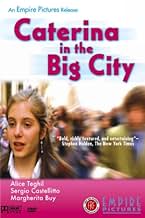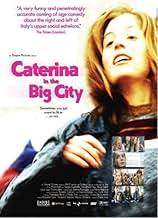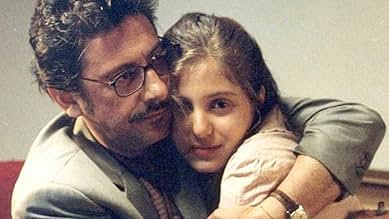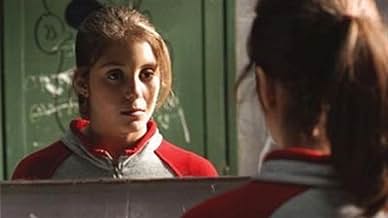AVALIAÇÃO DA IMDb
6,8/10
3,3 mil
SUA AVALIAÇÃO
Adicionar um enredo no seu idiomaCaterina, forced to leave her small town at the age of thirteen, faces the complications of living in the big metropoly of Rome.Caterina, forced to leave her small town at the age of thirteen, faces the complications of living in the big metropoly of Rome.Caterina, forced to leave her small town at the age of thirteen, faces the complications of living in the big metropoly of Rome.
- Direção
- Roteiristas
- Artistas
- Prêmios
- 7 vitórias e 9 indicações no total
Zach Wallen
- Edward
- (as Zach -James Smith- Wallen)
Margerita Mazzola
- Martina
- (as Margherita Mazzola)
Martina Tasquetta
- Alessia
- (as Martina Taschetta)
Giulia Gorietti
- Giada
- (as Giulia Elettra Gorietti)
- Direção
- Roteiristas
- Elenco e equipe completos
- Produção, bilheteria e muito mais no IMDbPro
Avaliações em destaque
I saw 'Caterina va in Città' in Sydney, where the audience had mixed reactions to the schoolboy who speaks Italian with what's apparently meant to be a Sydneysider accent. In general, I was impressed by the ensemble acting, but I felt that the best performance was given by Margherita Buy as the heroine's mother Agata. I was disappointed that Agata has so little to do with the main plot of the film.
The symbolism is just a trifle heavy-handed in this movie. Remember those Hollywood war movies from World War Two, in which the bomber crew conveniently had one member of every (white) ethnic group? (And there was usually one rich guy and one guy from the slums.) Well, director/co-scriptwriter Paolo Virzi has got that gimmick here, Italian style. When 15-year-old Caterina's parents move house from a Tuscan seaside town to Rome and enrol her in a big-city school, the student body conveniently includes the full spectrum of Italy's national archetypes. For example, Daniela is wealthy, beautiful and popular, the daughter of an official in the right-wing government. Margherita is a left-wing 'revolutionary', the daughter of a famous intellectual. Of course, the film implies that Margherita is somehow better and more 'authentic' than Daniela.
Because I found the political subplots of this movie to be deeply clichéd -- especially since Italy is in no position to lecture any other nation on the subject of politics -- I was pleased that the film's political content stays firmly secondary. The main story of this movie is, rightly, Caterina's uneasy and awkward progress through adolescence and into adulthood. It's no surprise to discover that being a teenage girl in modern Italy is difficult, but surely every adolescent -- male, female, rich, poor, in any century or culture -- has found adolescence to be a difficult time of transition. Except for some of its political comments, I found this to be a very honest and intelligent film, with characters I really cared about. I'll rate 'Caterina va in Città' 8 out of 10, and I look forward to more films from Paolo Virzi. Brava, Caterina!
The symbolism is just a trifle heavy-handed in this movie. Remember those Hollywood war movies from World War Two, in which the bomber crew conveniently had one member of every (white) ethnic group? (And there was usually one rich guy and one guy from the slums.) Well, director/co-scriptwriter Paolo Virzi has got that gimmick here, Italian style. When 15-year-old Caterina's parents move house from a Tuscan seaside town to Rome and enrol her in a big-city school, the student body conveniently includes the full spectrum of Italy's national archetypes. For example, Daniela is wealthy, beautiful and popular, the daughter of an official in the right-wing government. Margherita is a left-wing 'revolutionary', the daughter of a famous intellectual. Of course, the film implies that Margherita is somehow better and more 'authentic' than Daniela.
Because I found the political subplots of this movie to be deeply clichéd -- especially since Italy is in no position to lecture any other nation on the subject of politics -- I was pleased that the film's political content stays firmly secondary. The main story of this movie is, rightly, Caterina's uneasy and awkward progress through adolescence and into adulthood. It's no surprise to discover that being a teenage girl in modern Italy is difficult, but surely every adolescent -- male, female, rich, poor, in any century or culture -- has found adolescence to be a difficult time of transition. Except for some of its political comments, I found this to be a very honest and intelligent film, with characters I really cared about. I'll rate 'Caterina va in Città' 8 out of 10, and I look forward to more films from Paolo Virzi. Brava, Caterina!
Caterina gives us an opportunity to feel and a chance to hope. A young girl both naive and somehow mature, she is unsure of what she wants in life. Her task is learning to navigate the waters of a high school in Rome where she is the new girl from the sticks when her father is transfered from a small town on the coast. He fulfills his dream of returning to the cultural mecca of the capital where he hopes to take his "rightful" place among the intelligentsia. But the film turns on just this point"rightful place". There are no simple answers, though we do have an opportunity to see how complex it is to find one's place, rightful or not, in the world. Caterina is something of a metaphor for the Italian populace at large, I would think. But she is more than this. There is something about her story that touched me, several decades and half a world away from the world she inhabits, a world stratified by cliques and patronage, prejudice and injustice...a world very much like the one I live in and the one I imagine most of us live in. Caterinaas the film that bears her namedoes not take the easy way out in running away or self-repression or living a life of quiet desperation, even when her sheltered provincial upbringing and less-than-ideal family situation do not give her any clues on how to deal with her new life and classmates from prominent families. She tries to adjust to the fast-pace and superficiality of life in the Italian capital, and much of the fun of the movie is seeing her in the various situations she encounters along the way. Her father is great as the frustrated writer with no talent and a loud voice, a self-important boor. My heart goes out to all the Caterinas of the world, who go forward with optimism and pure heart even when they know the odds are against them.
'Caterina va in citta' ('Caterina in the Big City') is an Italian film that takes as its storyline the coming of age of a young teenager transported by her family from the quiet Tuscany seaside village of Montaldo Di Castro to the challenging realities of Big City Rome, but that is only the means to an end of exploring Italian politico-social life and its effects on the youth of today. It comes very close to drowning in its own excesses, but at the root of the film is a sensitive tale of a young girl's struggles with growing into an adulthood that puzzles, frightens and challenges her.
Caterina (Alice Teghil) finds her greatest moments of happiness in her home town singing mezzo soprano in the choir: simple pleasures in a simple setting surrounded by country folk content to live life day to day. Her father Giancarlo (Sergio Castellitto) is a teacher who can't hold a job, partially because he is so outspoken and partially because he is a raving truly obnoxious person. Her mother Agata (Margherita Buy) is subservient, a woman with few coping mechanisms who allows her odious husband to run an abusive household. Giancarlo's aunt is ill in Rome and with the idea of finding a job where his talents are respected, Giancarlo uproots his little family and moves to the big city. There the social castes are evident and Caterina is judged a country hick until she is befriended by first a rebel who bonds with Caterina, introduces her to tattoos and liquor, and causes a schism between her important mother (Giancarlo hoped to have is novel published by the woman), the daughter and his family. Caterina then is absorbed into the rich and spoiled rank and file of the wealthy, not fitting in until the girls do a make over. That situation is again disrupted by Giancarlo's blindly inappropriate behavior. The true Caterina is somehow lost, still dreaming of becoming a fine mezzo soprano, but tagging along with the crowd du jour. Ultimately Giancarlo's multiple and consistent failures drive him away from the family, he rides off to oblivion on his restored motorbike, and Agata and Caterina both bloom.
The noise level of this film is such that it is difficult to watch: the young girls means of communication is a mixture of screaming, loud talking, and fighting and otherwise making us uncomfortable. Yet underneath all of the political and social expose and brandishing is a truly wonderful young Caterina whose life as a soap opera is watched tenderly by an Australian boy who plays the guitar and observes her family from a window across the way from Caterina's Rome home. The moments toward the end of the film when the playback comes justifies the fuss of getting there.
This is not a film this viewer would sit through again, but reflecting on the story after all the commotion is over, hearing Mozart's 'Ave Verum Corpus' and Verdi's 'Nabucco" etc as the inspiration behind Caterina's honest dreams, makes is a more memorable experience. In Italian with English subtitles. Grady Harp
Caterina (Alice Teghil) finds her greatest moments of happiness in her home town singing mezzo soprano in the choir: simple pleasures in a simple setting surrounded by country folk content to live life day to day. Her father Giancarlo (Sergio Castellitto) is a teacher who can't hold a job, partially because he is so outspoken and partially because he is a raving truly obnoxious person. Her mother Agata (Margherita Buy) is subservient, a woman with few coping mechanisms who allows her odious husband to run an abusive household. Giancarlo's aunt is ill in Rome and with the idea of finding a job where his talents are respected, Giancarlo uproots his little family and moves to the big city. There the social castes are evident and Caterina is judged a country hick until she is befriended by first a rebel who bonds with Caterina, introduces her to tattoos and liquor, and causes a schism between her important mother (Giancarlo hoped to have is novel published by the woman), the daughter and his family. Caterina then is absorbed into the rich and spoiled rank and file of the wealthy, not fitting in until the girls do a make over. That situation is again disrupted by Giancarlo's blindly inappropriate behavior. The true Caterina is somehow lost, still dreaming of becoming a fine mezzo soprano, but tagging along with the crowd du jour. Ultimately Giancarlo's multiple and consistent failures drive him away from the family, he rides off to oblivion on his restored motorbike, and Agata and Caterina both bloom.
The noise level of this film is such that it is difficult to watch: the young girls means of communication is a mixture of screaming, loud talking, and fighting and otherwise making us uncomfortable. Yet underneath all of the political and social expose and brandishing is a truly wonderful young Caterina whose life as a soap opera is watched tenderly by an Australian boy who plays the guitar and observes her family from a window across the way from Caterina's Rome home. The moments toward the end of the film when the playback comes justifies the fuss of getting there.
This is not a film this viewer would sit through again, but reflecting on the story after all the commotion is over, hearing Mozart's 'Ave Verum Corpus' and Verdi's 'Nabucco" etc as the inspiration behind Caterina's honest dreams, makes is a more memorable experience. In Italian with English subtitles. Grady Harp
"Caterina va in città" seems like your typical teen film. It somehow reminds me of "Thirteen", but it goes a little deeper than the average American teen film.
In American teen films the parents are normally reduced to simple shadows that serve more as a background for their sons and daughters' lives - they are either of the preaching-repressive sort, or the tolerant, ever-forgiving parents, that eventually through love will help their children to the way of redemption.
Not so, "Caterina va in città". In this film, not just Caterina ( Alice Teghil) but her parents as well are portrayed as three-dimensional human beings and this makes the film more interesting.
Caterina and her parents move from a small Italian town to Rome. And there Caterina's life will be shaken. She goes to high school and meets new friends - many new things happen in her life. She feels uprooted from her old self, and doesn't know anymore who she really is.
One can say that "Caterina va in città" is a coming of age film - it portrays her search for her place in the world - many American teen films tell the same story. But what differentiates this film from its American counterparts is the attention it gives to the parents. The father Giancarlo (Sergio Castellito) is a deeply disturbed personality. He thinks the world revolves around him and there's a conspiracy of important segments of society whose main aim is preventing him from succeeding in life. He is an egoist that treats his wife as a dumb servant and his daughter as a beautiful puppy. But no, he's not a "bad" man - in his own distorted way he loves his wife and his daughter. Sergio Castellito gives us a stellar interpretation as the problematic father, underlining his pathetic and quixotic traits. Agata (Margherita Buy), is his ever-enduring wife - she has a deeper layer than it may appear at first glance. And there's Caterina living with them, seeing them with her innocent eyes.
The other characters in the film are what one could call walking clichés. Nothing that has not been shown before in American teen movies. Politics shows its colors in the film, but in a very superficial way. It's not really essential for the film's story - left and right could have been easily substituted for rival football teams.
The ending (difficult to imagine in American films) will come as a surprise and have a liberating effect on the viewer. All in all, "Caterina va in città" is a good teen film thats stands a bit above the usual film of the genre.
In American teen films the parents are normally reduced to simple shadows that serve more as a background for their sons and daughters' lives - they are either of the preaching-repressive sort, or the tolerant, ever-forgiving parents, that eventually through love will help their children to the way of redemption.
Not so, "Caterina va in città". In this film, not just Caterina ( Alice Teghil) but her parents as well are portrayed as three-dimensional human beings and this makes the film more interesting.
Caterina and her parents move from a small Italian town to Rome. And there Caterina's life will be shaken. She goes to high school and meets new friends - many new things happen in her life. She feels uprooted from her old self, and doesn't know anymore who she really is.
One can say that "Caterina va in città" is a coming of age film - it portrays her search for her place in the world - many American teen films tell the same story. But what differentiates this film from its American counterparts is the attention it gives to the parents. The father Giancarlo (Sergio Castellito) is a deeply disturbed personality. He thinks the world revolves around him and there's a conspiracy of important segments of society whose main aim is preventing him from succeeding in life. He is an egoist that treats his wife as a dumb servant and his daughter as a beautiful puppy. But no, he's not a "bad" man - in his own distorted way he loves his wife and his daughter. Sergio Castellito gives us a stellar interpretation as the problematic father, underlining his pathetic and quixotic traits. Agata (Margherita Buy), is his ever-enduring wife - she has a deeper layer than it may appear at first glance. And there's Caterina living with them, seeing them with her innocent eyes.
The other characters in the film are what one could call walking clichés. Nothing that has not been shown before in American teen movies. Politics shows its colors in the film, but in a very superficial way. It's not really essential for the film's story - left and right could have been easily substituted for rival football teams.
The ending (difficult to imagine in American films) will come as a surprise and have a liberating effect on the viewer. All in all, "Caterina va in città" is a good teen film thats stands a bit above the usual film of the genre.
I think Virzì is one of the most interesting director in Italy, at the present moment. His ability to portray the current Italian society is quite good, and he achieves this either with *characters* (the two families in "Ferie d'Agosto", the father in "Caterina va in città") and with *stories* (the story of "Ovosodo", a bit of an Italian "It's a wonderful life"... just a bit, obviously... :-).
"Caterina va in città" is a good movie: the idea of showing chunks of the Italian society and habits through the eyes of an innocent teenager gives the movie a "fairy tale" twist that makes it really "light" and enjoyable. I also liked the mom's character, played by a really good and beautiful Margherita Buy: in general, I appreciated Virzì's idea that the "good" part of society is based on the strength of women, as all male characters in this movie either are donquixotesque losers or spoiled and arrogant over-grown babies.
But, as for most of his movies, I think the same criticism again apply: Virzì is openly a left-wing director, but he stresses this a bit too much and sometimes its works sound too "ideological": art should make you think, not tell you what to think, I guess. In addiction, some characters are too stereotypical and don't come out of a really deep psychological analysis. Still, I think he is currently the director who knows best how to take on the screen what goes on in Italy.
In conclusion, I think this movie - just like "Ovosodo" - is based on a simple yet powerful assumption: that happiness is the disease of the idiots...
"Caterina va in città" is a good movie: the idea of showing chunks of the Italian society and habits through the eyes of an innocent teenager gives the movie a "fairy tale" twist that makes it really "light" and enjoyable. I also liked the mom's character, played by a really good and beautiful Margherita Buy: in general, I appreciated Virzì's idea that the "good" part of society is based on the strength of women, as all male characters in this movie either are donquixotesque losers or spoiled and arrogant over-grown babies.
But, as for most of his movies, I think the same criticism again apply: Virzì is openly a left-wing director, but he stresses this a bit too much and sometimes its works sound too "ideological": art should make you think, not tell you what to think, I guess. In addiction, some characters are too stereotypical and don't come out of a really deep psychological analysis. Still, I think he is currently the director who knows best how to take on the screen what goes on in Italy.
In conclusion, I think this movie - just like "Ovosodo" - is based on a simple yet powerful assumption: that happiness is the disease of the idiots...
Você sabia?
- CuriosidadesSara Pallini's debut.
- Erros de gravaçãoThe story begins in 2003, but the dates do not match up with the days of the week for that year.
- ConexõesReferences Os Irmãos Cara de Pau (1980)
- Trilhas sonorasInno ufficiale dei giovani fascisti
Music by Giuseppe Blanc and lyrics by Vittorio E. Bravetta
Sung at the wedding reception
Principais escolhas
Faça login para avaliar e ver a lista de recomendações personalizadas
- How long is Caterina in the Big City?Fornecido pela Alexa
Detalhes
Bilheteria
- Faturamento bruto nos EUA e Canadá
- US$ 296.464
- Fim de semana de estreia nos EUA e Canadá
- US$ 9.352
- 5 de jun. de 2005
- Faturamento bruto mundial
- US$ 4.407.426
- Tempo de duração
- 1 h 47 min(107 min)
- Cor
- Mixagem de som
- Proporção
- 2.35 : 1
Contribua para esta página
Sugerir uma alteração ou adicionar conteúdo ausente






















